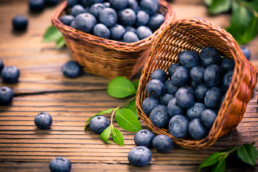Blueberries 101: Benefits, Uses, And More
This humble little berry packs quite a powerful punch. Blueberries have numerous health benefits and are a tasty treat. These berries are sweet, nutritious, and popular amongst health enthusiasts. Because of all the benefits blueberries possess, they are labeled as a superfood. Furthermore, blueberries are a low-calorie addition to your diet. Many people (myself included) consider blueberries their favorite fruit. Because it is my favorite fruit, I felt it was time to show this berry some love. This article will explore everything you need to know about blueberries, including how to eat them, health benefits, nutrients, storage, different ways to add them to your diet, and whatever else I can think of.
What Is A Blueberry?
On the off-chance you've never heard of blueberries, here is a quick science lesson. Blueberries are a native berry of North America. A berry is a fruit produced from a single flower with no barrier between the seed and the pulp. Based on this botanical definition, some "berries" are not actually berries. An example would be strawberries. It's the same brain-scratcher you deal with when you realize a tomato is a fruit and not a vegetable!
When Are Blueberries In Season?
Depending on where in North America you are located, blueberries can be harvested anytime between April and October. However, you can buy them from the grocery store year-round.
Variations of Blueberries
Generally speaking, blueberries are picked from highbush plants and lowbush plants. The berries you get from the grocery store are likely from highbush plants. Wild blueberries found in forests or fields are usually lowbush plants.
Different Ways To Store Blueberries
How w you store your blueberries will depend on how you bought/collected them as well as what you intend to do with them.
If You Bought Them Fresh:
When you buy blueberries fresh from the produce market, they are usually in a container. Put them in the fridge when you get home to keep them cool. Only wash them if you plan to immediately use them. Keeping them cool in the fridge should help them last 10-14 days.
If You Bought Them Frozen:
If you bought a frozen bag of blueberries from the store so they would last longer, get them into your freezer as quickly as possible so they do not defrost. For use in a smoothie, you can take them straight from the bag and into your blender. For use for salads, cereal, oatmeal, or to eat raw, make sure they defrost a little before consumption.
If You Bought Them Fresh But Want To Freeze Them:
For freezing blueberries yourself, place them on a baking sheet in the freezer for 1-2 hours until frozen, and then place them in an airtight container/bag. You do not need to wash them before freezing them.
What Are The Health Benefits Of Blueberries?
There are so many health benefits associated with blueberries that I could write an article on just that, so I will list of a few of the most important health benefits of blueberries for this article.
Benefit #1: Low-Calorie & Nutrient Dense
Blueberries are incredibly nutrient-dense for their size. Here are some of the nutrition stats to expect from a 1-cup serving of blueberries:
- 84 calories
- 15g carbs
- 4g Fiber
- 1g Protein
- 24% DV of Vitamin C
- 36% DV of Vitamin K
- 25% DV of Manganese
These are essential vitamins and minerals your body needs to function at 100%.
Benefit #2: Packed With Antioxidants
Antioxidants are compounds that protect your body from free radicals. These free radicals are molecules that cause cell damage and stress in the body. This damage and stress lead to inflammation and other health problems over time. Blueberries have one of the highest antioxidant levels you can find in fruits. The main antioxidant compounds blueberries possess that help protect the body are anthocyanins. Thanks to these antioxidants, your body is able to detox heavy metals, boost nitric oxide production, and much more.
Benefit #3: Lowers Blood Pressure
While plenty of other fruits and vegetables help lower blood pressure, I want to highlight blueberries. This is thanks to those antioxidants blueberries are full of. Antioxidants reduce inflammation, which makes nitric oxide production easier for the body. As nitric oxide production ramps up, your blood can flow more effectively. As a result of better blood flow, your blood pressure will lower.
Benefit #4: Improves Brain Health
Once again we have antioxidants to thank for this health benefit. Since blueberries help destroy free radicals, they also promote brain function. Free radicals slow the brain down, speed up aging, and impairs brain functions like memory and concentration. Eating more blueberries enables those antioxidants to help improve brain function and slow down mental decline.
Benefit #5: Improves Muscle Recovery
We've all been there...sore and fatigued after a grueling workout. Some of that soreness and fatigue are due to oxidative stress and inflammation from the tearing of muscle fibers. Blueberries are shown to be able to provide a little help with reducing the damage to muscles and reducing muscle soreness after a tough workout. This is another benefit we have antioxidants to thank for.
Blueberry Health Benefits: Honorable Mentions
While I will not go into detail, here is a list of some other important health benefits blueberries provide to your body:
- Helps fight UTI's
- Fights off diabetes
- Helps reduce the risk of cardiovascular disease
- Helps reduce the risk of cholesterol problems
- Reduces DNA damage
- Reduces the risk of cancer(s)*
This little berry does so many good things for us...and boy is it tasty!
Fun Ways To Add Blueberries To Your Diet
Now for the good part. There is no shortage of ways to eat blueberries, so I will provide you with a list of some popular ways to eat blueberries.
Popular ways to eat blueberries include:
- Eat them raw. Grab a handful, rinse them off, and pop them in your mouth.
- Make a smoothie. You can blend blueberries into a delicious smoothie with other fruits, vegetables, milk, yogurt, and honey for a nutritious treat!
- Add them to your oatmeal. Throw a handful or two in your bowl of oatmeal for a filling breakfast.
- Add them to your cereal. Grab a handful and pop them into your bowl of cereal.
- Mix them in your pancake batter. Who doesn't love blueberry pancakes?
- Mix them into your desserts. Yes, blueberries make a great addition to desserts. You can add them to ice cream, yogurt, frozen yogurt, cakes, pies, and cobblers.
- Use them as a salad topping. Yep, they even go with salads. You can use blueberries as a topper to various salads to provide a hint of sweetness.
- Make jam. Blueberry jam is absolutely delicious! All you need are blueberries, a little sugar, and a saucepan to cook them in.
- Make popsicles. Add some blueberries into ice cubes with a little sugar and a small stick. Freeze them for a few hours and BOOM! You have home-made blueberry popsicles.
I'm sure I'm leaving off other methods for adding blueberries into your diet, but you get the gist. They are versatile berries that have no shortage of uses.
Thinking Of Growing Your Own Blueberries?
Most of you probably do not care about growing your own blueberries, but just in case you want access to all those blueberry benefits without shopping at the store every couple of weeks this section is for you.
Here is what you need to know about growing blueberries.
1. Buy A Blueberry Plant
Find a local plant nursery to buy a blueberry plant. You can also go exploring and find a wild blueberry plant to uproot and replant as well.
2. Make Sure The Plant Can Survive.
Plant conditions need to be just right in order for it to survive. Conditions will vary based on where you live. However, what you need to know is that blueberries require clay or rocky soil to grow best. Make sure you add some compost/organic fertilizer to your soil when you plant your blueberry bush. Adding some mulch to the top of your soil will help conserve moisture if you are located somewhere with little rainfall or minimal access to water. Ideally, your blueberry bush needs 1-1.25 inches of water weekly to thrive.
Fertilize your bush in the spring and late summer. Prune your bushes during the winter to prepare for new growth the following spring. Cut off all dead branches and chop about 1 inch off the top of the berry bush when pruning in the winter.
3. Planting Multiple Berry Bushes
For multiple berry bushes, plant them 5-6 feet apart for adequate growth space. For multiple rows of bushes, give each row 8-10 feet of space so you have room to pick the berry bushes once it's time to harvest. NOTE: It can take up to 2-3 seasons before your bushes produce berries, so be patient.
Once you see blossoms in the bushes' first season, snap those blossoms off to keep the plants strong.
4. Keep Pests Away
For dealing with pest control, consider netting your bushes to keep birds at bay. Wiring cages are also an option. For specific bugs, look into natural pesticides if there are problem insects in your area. Modern pesticides contain heavy metals, so make sure you look into natural options for pesticides.
5. Harvesting Your Blueberries
Once it is finally time to pick your berries, just start picking. Usually, peak season is mid-late July up until mid-autumn once frosts start to pop up. Ripe berries will have a deep blue/indigo color. If the berry is green or has any red on it, it is not ready yet so leave it be. When picking your berries, pluck them off the bush gently to avoid breaking the branches or crushing your berries.
6. Storing Your Berries
We did cover storage for berries at the beginning of the article, but here is a quick recap: you can put them in the fridge for use within the next 10-14 days or you can freeze them for year-round use. To freeze them, put them on a baking sheet without rinsing them and let them freeze, then put them in an airtight container/bag. Make sure to rinse before eating your blueberries.
Final Thoughts
Blueberries are an incredible superfood packed with essential micronutrients and provide many health benefits for us. There are many ways to add them to your diet and they can be eaten with every meal.
If you want to learn more about specific fruits, vegetables, and general healthy living, check out the rest of our blog here.

